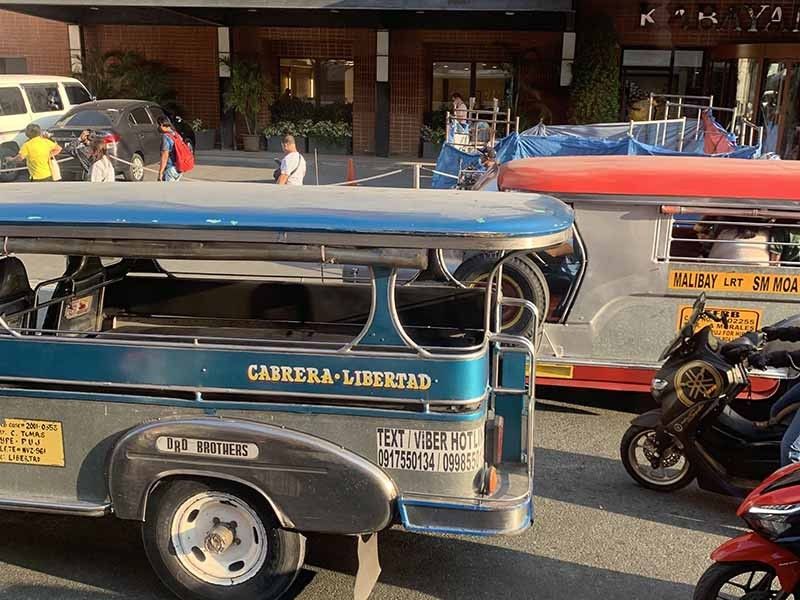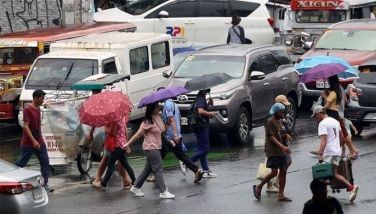UP paper: Jeepney 'modernization' risks corporate takeover of transport sector

MANILA, Philippines — Jeepney drivers and operators should have a bigger role in steering discussions on a campaign to shift to modern public utility vehicles, according to a policy brief prepared in collaboration with transportation and commuter advocacy groups that also says their welfare should be considered in the program.
According to a policy brief by the UP Center for Integrative and Development Studies, the Public Utility Vehicle Modernization Program presents "a window of opportunity for the corporate takeover of small-capacity public transportation in the Philippines."
That development would marginalize jeepney drivers and operators further since "only large corporations possess the financial capacity and resources to complete the requirements of the program without significant financial strain."
Instead, the policy brief argues, government should set a policy that will make public transportation reliable, safe and affordable and that would acknowledge that public transport is a public good "that should not be handed over to huge corporations and their profit interests."
The costs of mandatory cooperativization
The program requires jeepney operators and drivers to form cooperatives, which, brief writers said, already presents barriers to accessing limited loans that cover only around 5% of the cost of a modern jeepney unit.
Under the program, cooperatives must put up their own garage — with maintenance bays, restrooms and rest and waiting areas — without assistance from the government. Cooperatives that service end-to-end routes will need to put up garages at both ends.
They will also have to pay a fee of P300,000 for the consolidation of franchises, with another P20,000 fee for each modern jeepney.
The costs of the modern jeepneys may just end up being shouldered by commuters and may lead to "a ripple effect, leading to increased transportation costs for food and other goods, ultimately resulting in a rise in the cost of living for millions of households," they said.
The brief writers from UP CIDS, transport group PISTON and commuter advocacy group PARA–Advocates for Inclusive Transport said the jeepney modernization program needs to include jeepney drivers and operators and other stakeholders like commuters in a participatory process "in the design and implementation of public transport modernization programs [and] national transportation plans."
The government should also push for "genuine cooperativization" by taking responsibility for the public transport sector where jeepney drivers have filled the gaps. It said government should collaborate with drivers and small cooperatives to improve work arrangements in the industry.
"This approach can facilitate the eventual nationalization of public transit, whereby the government assumes full responsibility for managing and running the industry" through the cooperatives that would not take away individual jeepney franchises.
According to the policy brief, many jeepney drivers and operators are resistant to the push to form cooperatives because they fear the loss of their individual franchises, which they see as a lifeline to their livelihood. "A truly cooperative model allows for independent control by each operator over their individual franchises," the UP CIDS paper argues.
A planned phaseout of traditional jeepneys that would have seen drivers and operators who had not yet formed cooperatives off the road by June 30 led to a transport strike in early March. Transport groups, including Manibela and PISTON, announced on March 7 that the strike will be lifted after the government agreed to push back implementation until the end of 2023.
"We will hold President Ferdinand 'Bongbong' Marcos Jr to his word, that his administration is open to study and revise the implementation of the PUV modernization program to keep the livelihood of our PUV drivers and operators," Manibela president Mar Valbuena said after a dialogue with the Palace.
READ: Jeepney strike ends as gov't agrees to review modernization program
'Transport is government's responsibility'
But jeepneys, which account for a small proportion of vehicles on the road, should not be primarily taking the responibility and risk of fixing the transport sector, the brief writers also said, adding the government can reconsider forcing them to buy and use more expensive imported vehicles.
Shifting to rehabilitating existing jeepneys, an alternative proposed by some transport groups, can also lead to employment in a local transport industry that can assemble and repair, or even manufacture parts, for the rehabilitated jeepneys, they said.
"Rather than solely focusing on modernizing jeepneys, the government can explore alternative solutions to reduce carbon emissions without burdening transport workers and commuters," they said. "The government can provide greater subsidies and finances to transport workers in rehabilitating traditional jeepneys."
The government can also develop a comprehensive national transportation plan that would include infrastructure for road sharing and for active transport that will give commuters more options for transport and that would also lower carbon emissions.
"Broadly, the Just Transition approach is widely acknowledged as a means of shifting away from an unsustainable and unjust economic system characterized by the unchecked exploitation of natural and human resources to benefit a privileged minority," they said.
"It calls for transitioning towards an economy that recognizes ecological limitations and fosters inclusive and equitable development, particularly for marginalized sectors of society." — Jonathan de Santos
--
- Latest
- Trending

































